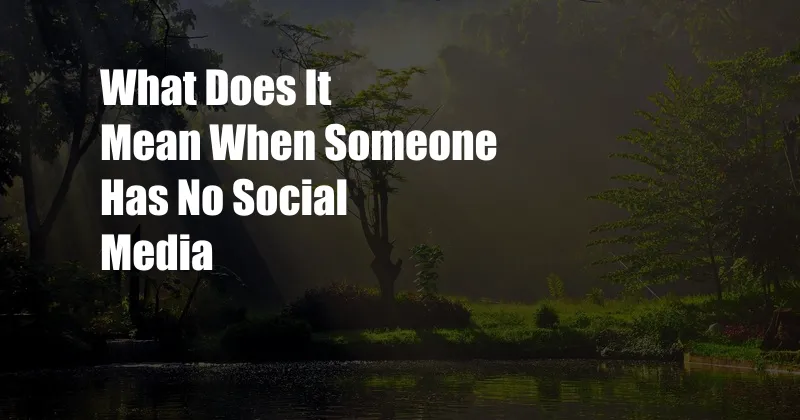
Why Do Some People Choose to Live Without Social Media?
As an avid social media user, I was intrigued when I met someone who had no online presence whatsoever. It was an alien concept to me, and I couldn’t help but wonder what their reasons were. After talking to them, I discovered that there are many complexities to the decision to live without social media, ranging from privacy concerns to mental health benefits.
The Appeal of Offline Living
1. Enhanced Privacy: Social media platforms collect vast amounts of data about their users, which can be used for targeted advertising, surveillance, and even manipulation. By abstaining from social media, individuals can protect their personal information and maintain greater control over their online presence.
2. Improved Mental Well-being: Numerous studies have linked excessive social media use to anxiety, depression, and low self-esteem. By avoiding the constant comparison, FOMO (fear of missing out), and cyberbullying that can be prevalent on social media, individuals may experience improved mental health and a more positive self-image.
A Deeper Dive into Social Media Avoidance
Definition: Social media avoidance refers to the intentional decision to refrain from using social media platforms such as Facebook, Instagram, and Twitter. This abstinence can be temporary or permanent, and the motivations behind it vary widely.
History: The term “social media avoidance” gained popularity in the early 2010s as social media use became increasingly widespread. However, the concept of avoiding social interactions and human contact has been observed throughout history, often associated with monasticism and hermitage.
Meaning: For some, social media avoidance is a way to disconnect from the constant notifications and distractions of the digital world. For others, it is a form of self-care, a way to protect their mental health and well-being.
Exploring the Benefits of Social Media Abstinence
1. Increased Productivity: Without the interruptions and distractions of social media, individuals may find themselves with more time to focus on their work, hobbies, and personal relationships.
2. Improved Sleep: The blue light emitted from electronic devices can interfere with sleep. By avoiding social media before bedtime, individuals may experience improved sleep quality and duration.
3. Enhanced Mindfulness: Social media can be a constant source of external stimulation, taking away from the present moment. By abstaining from social media, individuals may become more mindful of their surroundings and appreciate the beauty of the present.
4. Stronger Relationships: While social media can provide a sense of connection, it can also lead to superficial interactions and a decline in real-world relationships. Avoiding social media can allow individuals to focus on building deeper, more meaningful connections with those around them.
Tips for Embracing Social Media Abstinence
Expert Advice:
- Start gradually: Don’t try to quit social media overnight. Start by reducing your usage time gradually until you have fully transitioned to being social media-free.
- Identify your triggers: Determine what situations or emotions lead you to crave social media. Once you know your triggers, you can develop strategies to cope with them without resorting to social media.
- Seek support: If you are struggling to avoid social media, talk to a trusted friend, family member, or therapist. They can provide encouragement and support during your transition.
Frequently Asked Questions (FAQs)
Q: Is it possible to live without social media?
A: Yes, it is possible to live a fulfilling and social life without social media.
Q: What are the benefits of avoiding social media?
A: Benefits include enhanced privacy, improved mental health, increased productivity, improved sleep, and stronger relationships.
Q: How do I know if I should avoid social media?
A: If you find yourself constantly comparing yourself to others, experiencing anxiety or depression, or neglecting your work or relationships due to social media, it may be beneficial to consider reducing or avoiding social media use.
Conclusion
The decision to avoid social media is a personal one, and there are many factors to consider. Whether you choose to abstain from social media or not, it is important to be mindful of your online habits and to prioritize your physical and mental well-being.
Are you interested in exploring the topic of social media avoidance further? Let me know in the comments below!